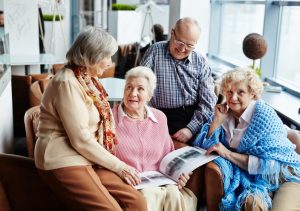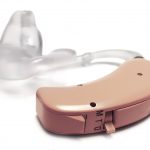 Hearing problems and vision impairment in seniors reduce active participation in events and activities. It is important for older adults to stay socially active as it helps improve quality of life and overall health outcomes, but their ability to engage in social activities can be hindered with presence of hearing or vision problems.
Hearing problems and vision impairment in seniors reduce active participation in events and activities. It is important for older adults to stay socially active as it helps improve quality of life and overall health outcomes, but their ability to engage in social activities can be hindered with presence of hearing or vision problems.
Researcher of the vision study Anne Viljanen said, “Sensory impairments are common among older adults. About one third of Europeans aged 50 and older were found to have impairment in hearing, vision, or both sensory functions. Sensory problems are markedly more common amongst older age groups.”
Advertisement
Researcher of the hearing study Tuija Mikkola added, “We found that older adults with hearing problems participate in group activities and meet their friends less often than those with good hearing.” The study found that those with hearing problems perceived their quality of life lower than those who could hear well.
The hearing study included 848 community-dwelling persons over the age of 75. Nearly half of the participants reported some difficulties and one in 10 reported major difficulties while conversing with others in the presence of noise.
The vision study included over 27,000 Europeans over the age of 50.
Viljanen added, “The study evaluated the prevalence of hearing and vision problems and whether these sensory impairments are linked to social activity. People with vision or hearing problems were less socially active than those without sensory problems, and those with both vision and hearing problems were least socially active.”
Both researchers suggest that prevention and rehabilitation efforts are required in order to offer older adults support in improving their sensory difficulties, so they can live active social lives.
Living with impaired vision and hearing problems in older adults
There are natural and medical ways to improve or prevent vision and hearing loss. This can grant a person greater freedom and allow them to be more social because of it, thus improving the quality of their life.
Preserving your vision is important, there’s no doubt in that, but before you turn to costly drugs or surgery, you’ll definitely want to try these home remedies for good eyesight.
You may have heard of the traditional Chinese medicine of acupressure, which involves applying pressure to points in the body to boost circulation and promote healing. This treatment is similar to acupuncture, but instead of using fine needles, fingers target the healing points.
Acupressure for eye health is an effective natural way to improve eyesight – and you can easily perform it on yourself.
Around your eye, there are seven acupressure points to focus on. They start at the corner of your eye – closest to your nose – and continue across the brow, ending underneath your eyelid. Massaging each point for at least 10 second promotes circulation to the eyes.
Another natural way to improve eyesight is through your diet. We can get so many benefits just from the things we eat, and a diet packed with nutrient-rich vegetables like carrots and omega-3 fatty acids supports healthy vision.
A 2007 Harvard Medical School study looked at the benefits of omega-3 fatty acids for eye health in mice. The researchers found that consumption of omega-3s supported healthy blood vessel growth, which is essential for proper vision. Omega-3s can be found in many nuts and fish, for example, almonds and salmon.
Other beneficial nutrients for supporting better eyesight are vitamins A, B-complex, C, D, and E, as well as beta-carotene, amino acids, and other antioxidants, commonly found in leafy greens, berries, and carrots.
Bananas and kale have been previously reported to provide useful eye nutrients as well. Kale, along with spinach, collards, and turnip greens, contains high amounts of an antioxidant that is essential for healthy vision.
Just as your body requires exercise to function at its best, your eyes need to do some exercise as well. This will help to improve focus and concentration, and combat eye strain.
Glaucoma risk and retinal degeneration progression can be reduced with physical fitness and aerobic exercise. The study findings revealed that exercise may have long-term positive impact on low ocular perfusion pressure (OPP), which is a risk factor for glaucoma.
The researchers examined the relationship between physical activity and OPP among 5,650 men and women. The participants were evaluated on their physical activity levels with detailed self-administered health and lifestyle questionnaires. Intraocular (eye) pressure and blood pressure were also checked. The results showed that physical exercise performed 15 years prior is associated with a 25 percent lower risk of low OPP.
Exercise can also help ward off vision problems in diabetics. The most common cause of vision loss in diabetics, diabetic retinopathy “involves changes to retinal blood vessels that can cause them to bleed or leak fluid, distorting vision,” according to the U.S. National Eye Institute.
Advertisement
Lastly, a cochlear implant is an electrical mechanical device that replaces the function of the damaged inner ear. Unlike hearing aids, which amplify sound so a person can hear, cochlear implants bypass the damaged cells to that the sound signals can be carried to the brain.
 Benefits of a cochlear implant include:
Benefits of a cochlear implant include:
- Hearing better
- Understanding sentences up to 80 percent greater
- Focusing better in noisy environments
- Making conversations easier, especially in crowded environments
- Reconnecting with sounds that were previously lost
- Feeling safer
- Talking and hearing on the phone
- Enjoying music
Here are a few tips to prevent or slow down hearing loss:
- Wear protective hearing gear, especially in the presence of loud noises
- Keep sounds from devices – TV, music player, etc. – to a minimum, especially if using headphones
- Get your hearing checked regularly
- Avoid injuries to the head
- Don’t stick objects or cotton swabs into your ear
- Avoid long hours inloud noise environments
- Ensure you are cleaning your ears effectively.
